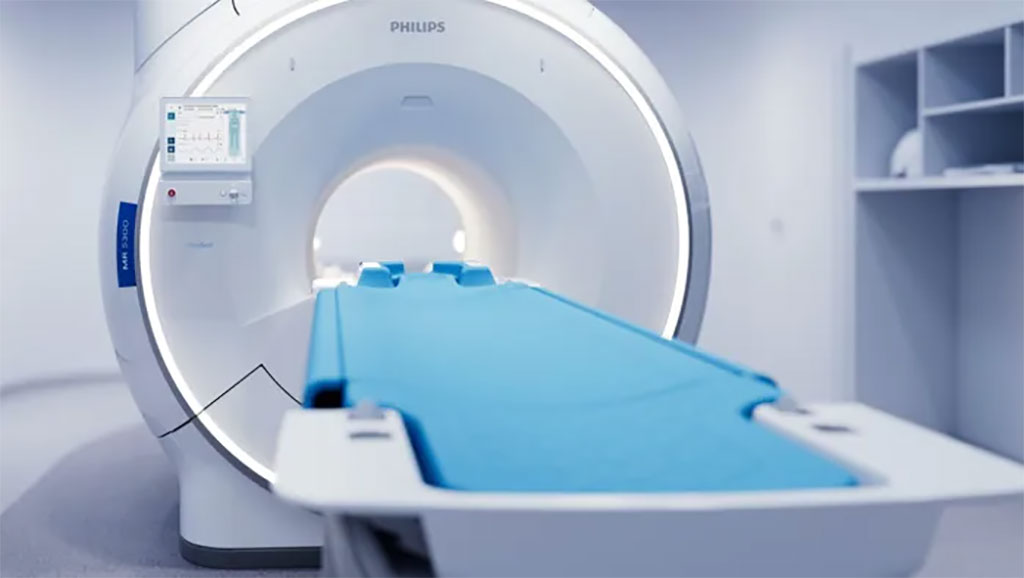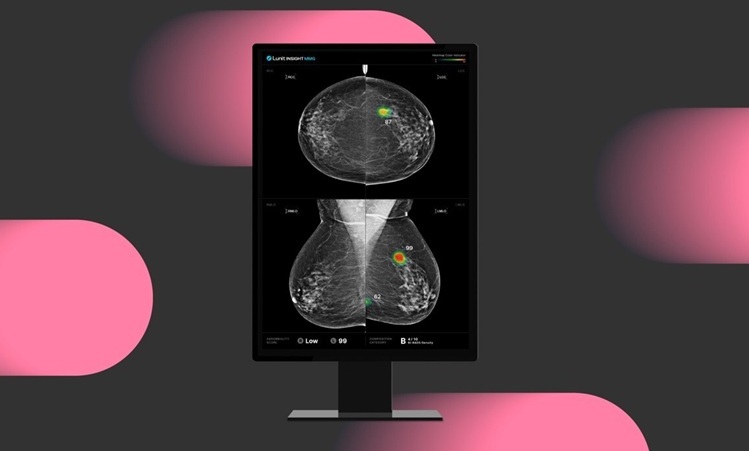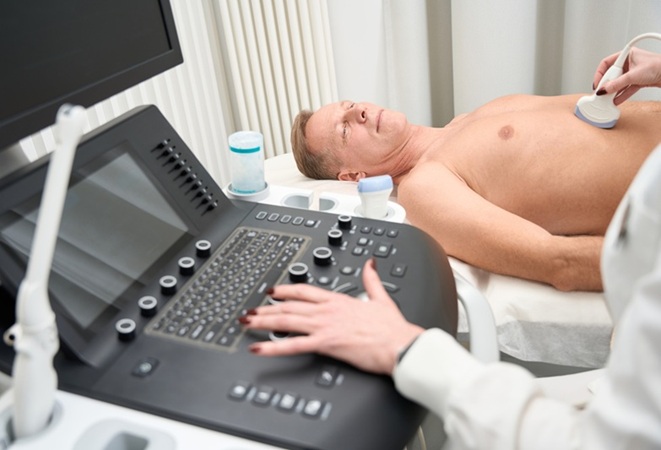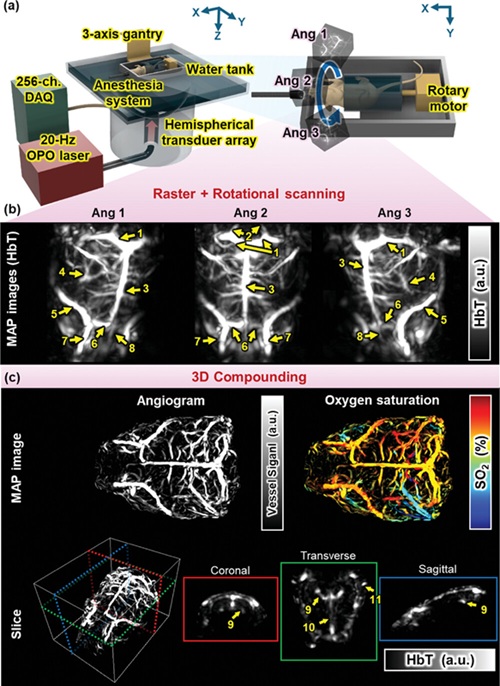Philips Launches New AI-Enhanced MR Innovations at RSNA 2021
|
By MedImaging International staff writers Posted on 29 Nov 2021 |

Royal Philips (Amsterdam, Noord-Holland) launched new AI-enabled innovations in MR imaging at the Radiological Society of North America (RSNA) annual meeting (November 23 – December 2, Chicago, USA).
Philips’ new MR portfolio of intelligent integrated solutions is designed to speed up MR exams, streamline workflows, optimize diagnostic quality, and help ensure the efficiency and sustainability of radiology operations. As MR imaging plays an ever-increasing role in precision diagnosis, radiology departments face multiple challenges such as workload demands due to the backlog of cases resulting from the COVID-19 pandemic, a growing population of clinically challenging patients, and a worldwide shortage of skilled technicians. As a result, there is a clear need for smart diagnostic systems, optimized workflows, and integrated clinical solutions that reduce time-to-diagnosis, improve patient throughput, reduce the need for rescans, and enhance the patient and staff experience.
Among several new AI-enhanced MR innovations launched by Philips at RSNA 2021 were Philips SmartSpeed, designed to speed up image acquisition and enhance image quality and diagnostic confidence for every patient, and the company’s new MR Workspace with AI assistance, which delivers an intuitive solution to simplify the path from image acquisition to diagnosis to help improve MR workflow and staff experience. Other introductions included the company’s new MR 5300 and MR 7700 smart connected systems.
Philips’ new MR 5300 system introduced for the first time at RSNA 2021, has received 510(k) clearance from the U.S. Food and Drug Administration (FDA). With this introduction, the company’s latest BlueSeal fully-sealed helium-free in operations MR scanner continues the advancement of a full helium-free operating portfolio of Philips MR solutions. Powered by AI, the MR 5300 simplifies and automates complex clinical and operational tasks for outpatient clinical use and MR departments to help increase access to affordable, quality care. The MR 5300’s large (55cm) field-of-view provides extended anatomical coverage, while its robust AI-powered scanning methods and easily positioned ultra-lightweight dStream Breeze coils work together to generate exceptional image quality, especially when imaging challenging anatomies such as the spine and abdomen. By simplifying and automating many of the complex clinical and operational tasks involved in capturing high-quality images, MR 5300 enhances the consistency and productivity of radiology department output, helping to increase patient satisfaction scores and referral rates. Its helium-free operations make it suitable for use in outpatient clinics, as well as dedicated radiology departments.
Also making its debut at RSNA 2021 was Philips’ new MR Workspace with AI assistance which is designed to simplify the path from image acquisition to diagnosis and empower technologists – regardless of their experience or patient challenges – to drive productivity and predictability. MR Workspace’s intuitive dashboard fully automates the planning and execution of many routine scans and eliminates guesswork by suggesting the most suitable Exam Card for each patient to ensure consistency in radiology department operations.
Another major reveal at RSNA 2021 was Philips’ new MR 7700 system integrated with multinuclear clinical capabilities to give clinical researchers the confidence to explore new imaging pathways. Researchers can also leverage the accuracy, power, and endurance of the MR 7700’s XP gradients to help facilitate demanding research programs to boost neuroscience excellence, and leverage the built-in AI technology for very high-performance clinical practice. The MR 7700’s gradient is designed to deliver the highest level of performance, state-of-the-art diffusion imaging, excellent signal-to-noise ratio (SNR), and motion detection technology to support outstanding imaging results. The MR 7700 system’s high homogeneity and linearity bring precision to both anatomical and functional imaging, supporting confident decision making. The system aims to tackle existing, new, and future clinical and research demands, while addressing the upswing in patient volumes experienced by many of today’s radiology departments. With this latest release, Philips has expanded to five additional nuclei to advance clinical insight with more metabolic and functional information across anatomies and making Multi Nuclei imaging a part of the daily MR clinical workflow.
At RSNA 2021, Philips also launched its new SmartSpeed reconstruction platform, designed to support the latest AI innovations. The platform, which features an award winning AI algorithm (Adaptive-CS-Net) applied directly at the source of the MR signal, is the next big advance on Philips’ existing Compressed SENSE acceleration technology, further enhancing the ability to reconstruct a full image from under-sampled data while maintaining virtually equivalent image quality. The projected speed advantages will help radiology departments to significantly increase patient throughput and enhance diagnostic confidence in a wider range of patients, including patients who are in pain, who struggle to hold their breath during the exam, or who have MR conditional implants. The SmartSpeed platform is designed to support 97% of current clinical protocols.
“At this year’s RSNA, we are focused on introducing scalable high performance MR systems to the imaging enterprise, with intelligent software built in to automate tasks to help relieve the burden on radiology staff and departments,” said Arjen Radder, General Manager of MR at Philips. “With AI-driven smart connected systems, optimized workflows, and integrated clinical solutions, our goal is to deliver high quality diagnostic images while also improving radiology department productivity by relieving radiologists of burdensome routine tasks so they have more time to take care of their patients.”
“At RSNA, we continue our commitment to helium-free sustainability in MR operations with new and enhanced technology to provide fast, fully automated, and highly personalized exams for every patient without compromising image quality, while also acting responsibly towards the planet and society,” Radder added.
Related Links:
Royal Philips
Latest RSNA 2021 News
- Samsung Showcases Its Premium Diagnostic Imaging Solutions in Ultrasound, DR and Mobile CT at RSNA 2021
- Konica Minolta Introduces New High Performance Mobile X-Ray and High-Definition FPD at RSNA 2021
- Hologic Showcases Extensive Portfolio of Breast and Skeletal Health Products at RSNA 2021
- Visage Imaging Introduces Easy to Create Video Radiology Reports for Improved Patient Engagement at RSNA 2021
- Agfa Healthcare Launches its New Valory Digital Radiography (DR) Room at RSNA 2021
- GE Healthcare Introduces Industry’s First Modular, Scalable Computed Tomography (CT) Platform at RSNA 2021
- Fujifilm Launches New High Performance Velocity MRI System at RSNA 2021
- Bracco Celebrates Personalized and Precision Medicine Innovations at RSNA 2021
- PaxeraHealth Launches Ark Platform to Make AI More Accessible and Affordable at RSNA 2021
- IBM Watson Health Presents New Portfolio of Solutions Designed for Enterprise Imaging, Radiology and Cardiology at RSNA 2021
- Varex Exhibits Highly Innovative Photon Counting X-Ray Detectors at RSNA 2021
- Carestream Showcases Enhanced DR Room Imaging and AI Innovations at RSNA 2021
- Guerbet Showcases Comprehensive Range of Imaging Products, Solutions, and Services for Diagnostic Imaging at RSNA 2021
- Sectra Highlights Brilliant Radiology Workflows at RSNA 2021
- Barco Presents Solutions for Mammography, Remote Radiology Reading, Interventional Radiology and QA at RSNA 2021
- Siemens Unveils World’s First Photon-Counting CT at RSNA 2021
Channels
Radiography
view channel
Higher Chest X-Ray Usage Catches Lung Cancer Earlier and Improves Survival
Lung cancer continues to be the leading cause of cancer-related deaths worldwide. While advanced technologies like CT scanners play a crucial role in detecting lung cancer, more accessible and affordable... Read more
AI-Powered Mammograms Predict Cardiovascular Risk
The U.S. Centers for Disease Control and Prevention recommends that women in middle age and older undergo a mammogram, which is an X-ray of the breast, every one or two years to screen for breast cancer.... Read moreMRI
view channel
Ultra-Powerful MRI Scans Enable Life-Changing Surgery in Treatment-Resistant Epileptic Patients
Approximately 360,000 individuals in the UK suffer from focal epilepsy, a condition in which seizures spread from one part of the brain. Around a third of these patients experience persistent seizures... Read more
AI-Powered MRI Technology Improves Parkinson’s Diagnoses
Current research shows that the accuracy of diagnosing Parkinson’s disease typically ranges from 55% to 78% within the first five years of assessment. This is partly due to the similarities shared by Parkinson’s... Read more
Biparametric MRI Combined with AI Enhances Detection of Clinically Significant Prostate Cancer
Artificial intelligence (AI) technologies are transforming the way medical images are analyzed, offering unprecedented capabilities in quantitatively extracting features that go beyond traditional visual... Read more
First-Of-Its-Kind AI-Driven Brain Imaging Platform to Better Guide Stroke Treatment Options
Each year, approximately 800,000 people in the U.S. experience strokes, with marginalized and minoritized groups being disproportionately affected. Strokes vary in terms of size and location within the... Read moreUltrasound
view channel
Tiny Magnetic Robot Takes 3D Scans from Deep Within Body
Colorectal cancer ranks as one of the leading causes of cancer-related mortality worldwide. However, when detected early, it is highly treatable. Now, a new minimally invasive technique could significantly... Read more
High Resolution Ultrasound Speeds Up Prostate Cancer Diagnosis
Each year, approximately one million prostate cancer biopsies are conducted across Europe, with similar numbers in the USA and around 100,000 in Canada. Most of these biopsies are performed using MRI images... Read more
World's First Wireless, Handheld, Whole-Body Ultrasound with Single PZT Transducer Makes Imaging More Accessible
Ultrasound devices play a vital role in the medical field, routinely used to examine the body's internal tissues and structures. While advancements have steadily improved ultrasound image quality and processing... Read moreNuclear Medicine
view channel
Novel Radiotracer Identifies Biomarker for Triple-Negative Breast Cancer
Triple-negative breast cancer (TNBC), which represents 15-20% of all breast cancer cases, is one of the most aggressive subtypes, with a five-year survival rate of about 40%. Due to its significant heterogeneity... Read more
Innovative PET Imaging Technique to Help Diagnose Neurodegeneration
Neurodegenerative diseases, such as amyotrophic lateral sclerosis (ALS) and Alzheimer’s disease, are often diagnosed only after physical symptoms appear, by which time treatment may no longer be effective.... Read moreGeneral/Advanced Imaging
view channel
AI Model Significantly Enhances Low-Dose CT Capabilities
Lung cancer remains one of the most challenging diseases, making early diagnosis vital for effective treatment. Fortunately, advancements in artificial intelligence (AI) are revolutionizing lung cancer... Read more
Ultra-Low Dose CT Aids Pneumonia Diagnosis in Immunocompromised Patients
Lung infections can be life-threatening for patients with weakened immune systems, making timely diagnosis crucial. While CT scans are considered the gold standard for detecting pneumonia, repeated scans... Read moreImaging IT
view channel
New Google Cloud Medical Imaging Suite Makes Imaging Healthcare Data More Accessible
Medical imaging is a critical tool used to diagnose patients, and there are billions of medical images scanned globally each year. Imaging data accounts for about 90% of all healthcare data1 and, until... Read more
Global AI in Medical Diagnostics Market to Be Driven by Demand for Image Recognition in Radiology
The global artificial intelligence (AI) in medical diagnostics market is expanding with early disease detection being one of its key applications and image recognition becoming a compelling consumer proposition... Read moreIndustry News
view channel
GE HealthCare and NVIDIA Collaboration to Reimagine Diagnostic Imaging
GE HealthCare (Chicago, IL, USA) has entered into a collaboration with NVIDIA (Santa Clara, CA, USA), expanding the existing relationship between the two companies to focus on pioneering innovation in... Read more
Patient-Specific 3D-Printed Phantoms Transform CT Imaging
New research has highlighted how anatomically precise, patient-specific 3D-printed phantoms are proving to be scalable, cost-effective, and efficient tools in the development of new CT scan algorithms... Read more
Siemens and Sectra Collaborate on Enhancing Radiology Workflows
Siemens Healthineers (Forchheim, Germany) and Sectra (Linköping, Sweden) have entered into a collaboration aimed at enhancing radiologists' diagnostic capabilities and, in turn, improving patient care... Read more
















![Image: [18F]3F4AP in a human subject after mild incomplete spinal cord injury (Photo courtesy of The Journal of Nuclear Medicine, DOI:10.2967/jnumed.124.268242) Image: [18F]3F4AP in a human subject after mild incomplete spinal cord injury (Photo courtesy of The Journal of Nuclear Medicine, DOI:10.2967/jnumed.124.268242)](https://globetechcdn.com/mobile_medicalimaging/images/stories/articles/article_images/2025-02-24/Brugarolas_F8.large.jpg)



